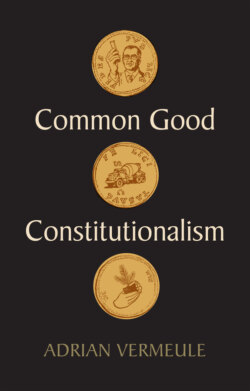Читать книгу Common Good Constitutionalism - Adrian Vermeule - Страница 22
Scope and Ambitions
ОглавлениеThis is the sort of book that might be done in either seventy thousand words or seven hundred thousand. I have opted for the former, on both circumstantial and methodological grounds. My intended audience is neither the student of first-order policy questions, nor the professional student of jurisprudence. (In the Anglophone world, at least, the latter have mainly opted to immure themselves in a sterile research program of hard positivism.) Rather my audience is the intelligent observer of the law, whether or not a lawyer, who intuits that something has gone very wrong with our law and our legal academy, but isn’t sure exactly how or why. At present, there is widespread and increasing dissatisfaction with establishment progressive rights-talk and establishment originalism. Thus timeliness is a consideration, and the book seemed more likely to make a contribution if it appeared sooner rather than later.
The methodological point is that sometimes a broad sketch of a distant scene helps the unfamiliar observer apprehend it more clearly than does a detailed landscape. The thesis that the classical heritage of our law can be recovered and adapted for current and future conditions is sufficiently unfamiliar, and, when first ventilated, provoked such strangely violent reactions from both progressives and originalists,50 that it may be better to introduce it by degrees. I therefore provide an overall sketch of a view and a program, with illustrative applications, rather than a comprehensive treatise on the implications of common good constitutionalism in area after area. The notes are kept light, with no pretense of historical or doctrinal completeness. I hope to spark enough interest that others will explore similar themes; indeed they have already begun to do so.51 A model and inspiration for the book is Charles Black’s short work on Structure and Relationship in Constitutional Law52 – on a per-word basis, among the most influential works of legal theory.
